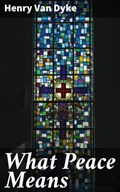In "What Peace Means," Henry Van Dyke offers a profound exploration of peace, articulating not only its significance in human existence but also its multifaceted nature. The text combines lyrical prose with a philosophical approach, creating an engaging narrative that reflects the complexities of inner and outer peace during a time of international turmoil. Van Dyke's work emerges in the context of early 20th-century thought, where questions of morality, spirituality, and societal harmony were increasingly relevant, making it a poignant reflection of its era. Henry Van Dyke was a distinguished author, theologian, and educator whose life experiences, including his time as a chaplain during World War I, deeply influenced his perspectives on peace. His literary career was marked by a desire to bridge the gap between faith and reason, drawing from his eclectic background in literature, philosophy, and social activism. This unique blend of influences imbues his writings with a wisdom that resonates with readers seeking understanding in a chaotic world. "What Peace Means" is recommended for anyone who yearns for calm in their personal or communal life. Van Dyke'Äôs eloquent prose not only inspires contemplation but also encourages action toward achieving peace. This reflective work serves as a timeless guide for those aspiring to understand and embody the essence of peace in today'Äôs world.

